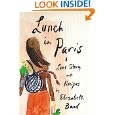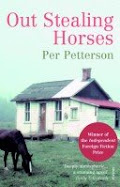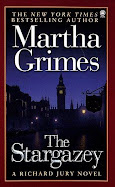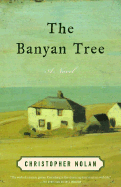For me the beauty of Out Stealing Horses was what the author didn’t say, those many unanswered questions that just hang there. We never learn how Jon came to use the watchword of the resistance: Are you coming? We’re going out stealing horses, a much more literal phrase for him and young Trond. We never find out what actually happened to Trond’s father, although Trond mentions that all he has to do is ask his coincidental neighbor Lars. We never know the thought process that caused his father to abandon his family, leaving them only a paltry sum in a Swedish bank, just enough to buy Trond a new suit. We know very little of the intervening years between 1948 and 2000, the present to which all else is a flashback. We never find out what happens between the two aging men who were once children together and who now cut up a fallen tree together. The final fate of Lars’ mother and Trond’s father is not mentioned, although one assumes they spent their remaining years after 1948 together.
The book has been criticized for being flat, a story told without emotion. But you have only to know Norwegians to realize this is the way they face life. The challenges and high points are rather flattened into a sort of continuum.
A central theme in the book is that of loss. Lars shoots his 10-year-old twin brother with a loaded gun left out by his older brother Jon. Jon wantonly smashes an egg from a goldcrest nest, possibly out of frustration for his dead brother; he then leaves home to join the navy. Trond’s father’s macho behavior causes Jon’s father to suffer injuries from which he never recovers. Trond loses his father altogether at the end of the summer of 1948. Trond’s second wife dies in a tragic car accident.
I felt a certain sadness as I watched an old guy try to become a hermit as a way of escaping from life. He is not naive to the existing dangers as he prepares for what could be a harsh Norwegian winter. It is only with some reluctance that he meets his neighbor, contacts someone to plough his snow, and talks to his adult daughter.
The language, even in its translation, is beautiful. We ride the horses bareback in Barkald’s field with teenage Jon and Trond. We feel the hormones rise as Jon’s mother approaches most any man or adolescent boy. We watch the ill-fated logs become stuck on their trip to Sweden. We understand the feelings of betrayal and disappointment Trond and his mother feel in the final chapter.
I especially like the very end of the book, where Trond and his mother have a brief respite from their troubles as they walk down the streets of Karlsrud with Trond wearing his new suit. In the last sentence he draws a line from his father’s philosophy “We do decide for ourselves when it will hurt.” And then the story is over for the reader.
Subscribe to:
Post Comments (Atom)












Hi Barbara! I have skipped straight to the comments page because I want to write my post before I read anyone else's thoughts. So I will be back to read through your post and comment :)
ReplyDeleteHello again Barbara.
ReplyDeleteYou have touched on so much of what is in the book- and there is so much, I feel it deserves multiple readings. I wonder- how many times have you read this book?
I did feel that in 'the old guy trying to become a hermit'-there was a reconciliation with the past which I have talked about in my post.
I agree that Petterson is a master story-teller. The bits that are not explicit- the questions we do not have answers to- are pieces that we do not need in order to see the whole picture. I think we have the whole picture but some of it is out of focus, in the distance, whilst Petterson focuses on the key issues. The elemental issues.
I had forgotten about the adolescent hormones bit- I though that was well described!
I agree with you that the language is beautiful. Interesting that you say it has been criticised for being 'flat'. I thought it was an intensely emotional book- the emotions are there under the surface, suppressed maybe- but it is the way Petterson is able to imply them that is so wonderful.
re the ending- I thought this was ironic. He says as a boy that he will decide when it will hurt- but the hurt comings flooding back as an old hermit, and cannot be resolved until it is aired in his reminiscences. Is his father's philosophy flawed?
thanks for your post- very thought-provoking! and thanks again for the book:)
Barbara you pretty much summed it up. I felt myself asking more questions at the story's end. There never seems to be any closure for Trond, after his father leaves for good. What ever became of him? The reader is taken on a journey from Trond being 15, directly to his older self. We get bits and pieces of his life in between, but not too substantial. His sister dying of cancer. His wife killed in a crash. Trond's selling off his business to buy the cabin and retire. We just get a glimpse of these events, through his mind's eye. I felt more needed to be added. I also felt that he and Lars were posssibly related. Who knows how long his father was really active with the resistance and Jon's mother? 'Tis not fully explained, perhaps because even Trond himself, did not know.
ReplyDeleteOver-all I did find it a bit of a slow read, but at times my interest did peak. The insane man that Jon's mother ended up bringing across the river, while still day-light. And the ensuing chase by the German soldiers on motour-bike. Franz dynamiting the bridge, ere that. The fact that now their whole operation was jeopardised and all had to escape to Sweden.
Trond does get a bit repetitive, as well. Maybe due to drudging up such past memories.
Like he wants the reader to make sure they understand him.
I did favour the ending and it was only too bad they couldn't spend the money in Norway. Why he got so agitated when asking a passerby for directions, I can only guess at. I wouldn't expect a neighbouring country to be fluent in my langauge.
Hi SubT- sorry you found it a slow read. Hopefully you will like the Martha Grimes??(seeing as it was your choice!) That will be a new one for me- I have ordered my copy from the library. I just love reading new styles, authors I have never heard of before- it's like tasting new foods :)
ReplyDeleteCinnamon, you may find your-self at a loss on the Martha Grimes book. I read them all out of order( 20 in the Jury series so far, except this one, I've yet to read ). This one takes place mid-series or so. But if you find your-self getting "hooked" you can then start with "Man with a Load Of Mischief", which is the first book. Currently reading "Cold Flat Junction" by MG and a wonderful book of verse by H.H.( Helen Hunt Jackson ). See my Friday basstuna post for more on her :) I'm sifting through my pile for a nice older read for July. Stay tuned...and I like your comparison with the food tasting. 'Tis true, 'tis true!
ReplyDeleteCinnamon, correction on H.H.~~'twas the Wed. post :)
ReplyDelete